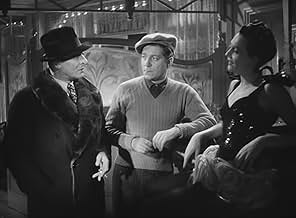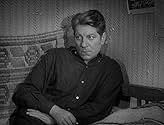Le jour se lève
- 1939
- Tous publics
- 1h 33m
IMDb RATING
7.7/10
8.6K
YOUR RATING
After committing a murder, a man locks himself in his apartment and recollects the events that led him to the killing.After committing a murder, a man locks himself in his apartment and recollects the events that led him to the killing.After committing a murder, a man locks himself in his apartment and recollects the events that led him to the killing.
- Awards
- 1 nomination total
René Génin
- Le concierge
- (as Genin)
Arthur Devère
- Mr. Gerbois
- (as Arthur Devere)
René Bergeron
- Le patron du café
- (as Bergeron)
Marcel Pérès
- Paulo
- (as Peres)
Annie Cariel
- Une locataire
- (uncredited)
Georges Douking
- L'aveugle
- (uncredited)
Georges Gosset
- Un agent
- (uncredited)
- Director
- Writers
- All cast & crew
- Production, box office & more at IMDbPro
Featured reviews
the main setting of "le Jour Se Leve" is the top floor of a french apartment. the film opens with Jean Gabin character Francois - a factory worker- killing a dog trainer named Valentin who we find out (as the story unravels itself) was "involved" with his girl. Francois then barricades himself from the police, and the reason for the death of Valentin is told in simple sets of flashbacks that Gabin remembers between cigarettes as he decides what his next move will be. the story is simple and delicate in manner and substance but nonetheless the director/writer team Marcel Carne and Jacques Prevert succeed in turning the realistic (and sometimes edgy) conversations, movements and places into poetry. and in response to an earlier review, the simplicity of the flashbacks, is what makes the movie so intriguing. instead of relying on a heavy plot that might challenge audience, Prevert and Carne decide to put great detail into a simple tale about a sentimental man who is torn to ruin by a contemptuous and Machiavellian man.
That was one of the last French masterpieces of the thirties just before the war.Marcel Carné was accused of pessimism and the movie was quickly forbidden by the military censorship that used to say in 1940:"if we've lost the war,blame it on "Quai des Brumes""(Carné's precedent movie.The director answered:"you do not blame a barometer for the storm"). "Le jour se lève " is,if it's possible,darker than its predecessor. From the very beginning,the hero,a good guy (Gabin) is doomed,his fate is already sealed,because the tragedy has already happened .That's why the movie is a long flashback.The memories are brought back on the screen with an astounding virtuosity by some elements of the set (the teddy bear for instance).Only three main characters outside that of Gabin,the evil one (Berry who was to play the devil in "les visiteurs du soir "1942),the lucid one (Arletty) and the ambiguous one (Jacqueline Laurent).The latter provides
the only flaw of the movie:Laurent acts Françoise as the innocent pure girl,however Carné leaves no doubt about her relations with Berry. A remake was made by Anatole Litvak with Henry Fonda ,Barbara Bel Geddes and Ann Dvorak (who must have been studying Arletty's acting for a long while),called "the long night" with an absurd happy end. Needless to say,it's the French Carné movie that you've got to see!
the only flaw of the movie:Laurent acts Françoise as the innocent pure girl,however Carné leaves no doubt about her relations with Berry. A remake was made by Anatole Litvak with Henry Fonda ,Barbara Bel Geddes and Ann Dvorak (who must have been studying Arletty's acting for a long while),called "the long night" with an absurd happy end. Needless to say,it's the French Carné movie that you've got to see!
We see a man shot; who he is and why we don't know. The murderer has locked himself inside his room. Police are forced to shoot in, trying to get him to surrender. The story then proceeds in flashback.
Marcel Carné directs this famous French film starring Jean Gabin. The two had worked together the previous year on "Le quai des brumes", a film well known then and now. If you are unfamiliar with Gabin, he was to the late 1930's in France what Bogey would be shortly in America, only Bogey with a soupçon of Cagney. More animated than Bogart, but less than Cagney with his agile song-and-dance-man side. A tough guy who's actually a good guy.
Now, a soft-hearted tough guy who's surrounded by police -- that could also describe Bogart's breakthrough film, "High Sierra", from 1941, and perhaps there is some superficial similarity.
However, this story is mostly a tale of love affairs and working class life -- that's really where its interest lies. There's a real sympathy here for the common man, when even a modest house on a rutted street would seem beyond his reach.
This film's original reputation may have been based at least in part on its Gallic openness about sexual matters. It's quite outré by the Anglo-Saxon standards of 1939. Regardless, the justly celebrated "Le jour se lève" has a poetic quality overall, and a memorably ironic final shot of the kind we don't seem to see quite often enough anymore.
Marcel Carné directs this famous French film starring Jean Gabin. The two had worked together the previous year on "Le quai des brumes", a film well known then and now. If you are unfamiliar with Gabin, he was to the late 1930's in France what Bogey would be shortly in America, only Bogey with a soupçon of Cagney. More animated than Bogart, but less than Cagney with his agile song-and-dance-man side. A tough guy who's actually a good guy.
Now, a soft-hearted tough guy who's surrounded by police -- that could also describe Bogart's breakthrough film, "High Sierra", from 1941, and perhaps there is some superficial similarity.
However, this story is mostly a tale of love affairs and working class life -- that's really where its interest lies. There's a real sympathy here for the common man, when even a modest house on a rutted street would seem beyond his reach.
This film's original reputation may have been based at least in part on its Gallic openness about sexual matters. It's quite outré by the Anglo-Saxon standards of 1939. Regardless, the justly celebrated "Le jour se lève" has a poetic quality overall, and a memorably ironic final shot of the kind we don't seem to see quite often enough anymore.
French cinema at its best. Ideas of freedom, entrapment, isolation and realism wound into a great film which is carried by Gabin from the opening scene of the murder, through flashbacks he has remembered to the amazingly brutal final shot. Gabin and Laurent in the factory near the beginning of the movie is poetic realism at its most involving.
Carne and Prevert on a roll; hot on the heels of 'Quai des Brumes' comes this, next up will be Les Visiteurs du Soir' and THAT will be followed by 'Les Enfants du Paradis'. Get out of that, John Ford/Dudley Nichols. Where do you start with something like this, someone send a Runner for a new set of superlatives. Start with the heavy? Jules Berry, they don't come any oilier, he'd already scored in a previous Prevert script, 'Le Crime du Monsieur Lange' with Renoir on bullhorn and he used this as a warm-up for his Satan in 'Visiteurs'. Arletty? Garance-in-Waiting, 'Hotel du Nord' behind her, 'Visiteurs/Enfants' to follow. Gabin? What can I say. Even Nat Cole didn't have a trio like this. To quote the title of an earlier (1935) Gabin vehicle this was truly La Belle Equipe. How Hollywood could cast Hank Fonda in the Gabin role is beyond me. Hank, 'aw shucks' Fonda, niceness personified as decent but RUGGED Gabin? Come on, already. Vincent Price plays Jules Berry? Get real! Sandy Trauner's brilliant apartment building sets the tone here from frame #1. What an opening, Jules Berry exiting Gabin's room and running out of breath. Crowd assembling. Nowhere-To-Go Gabin holed up in his 10 by 6 reminiscing in Gitane time. Never had a chance, life's a bitch and then you die. Basically that's all there is to it. But, as someone once said, it's the way you tell them. Brilliant in spades.
Did you know
- TriviaWhile not the first film to use dissolves to represent flashbacks, it was considered too new a method in the language of cinema that its producers' insisted on pre-title cards to avoid any confusion.
- Quotes
M. Valentin: You're the type women fall in love with . . . I'm the type that interests them.
- ConnectionsFeatured in Un compositeur pour le cinéma: Maurice Jaubert (1985)
- How long is Daybreak?Powered by Alexa
Details
Box office
- Gross US & Canada
- $35,321
- Opening weekend US & Canada
- $11,864
- Nov 16, 2014
- Gross worldwide
- $35,321
- Runtime1 hour 33 minutes
- Color
- Aspect ratio
- 1.37 : 1
Contribute to this page
Suggest an edit or add missing content































